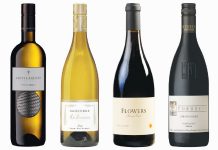Story by Charles Fredy
 A well-known Napa Valley winemaker once showed me a vineyard he’d bought dirt-cheap from a neighbor who considered it a total loss. The plants had been infected by a pest that nearly destroyed the vineyard. What happened next was extraordinary. The winemaker stopped watering and fertilizing, and within a few seasons . . . the vines were back to health! The winemaker knew that grapevines can be trained to send their roots a dozen or more feet into even the rockiest soil. Deprived of surface nourishment, his vines dug down. Without a root ball near the surface, the insects lost their free meal.
A well-known Napa Valley winemaker once showed me a vineyard he’d bought dirt-cheap from a neighbor who considered it a total loss. The plants had been infected by a pest that nearly destroyed the vineyard. What happened next was extraordinary. The winemaker stopped watering and fertilizing, and within a few seasons . . . the vines were back to health! The winemaker knew that grapevines can be trained to send their roots a dozen or more feet into even the rockiest soil. Deprived of surface nourishment, his vines dug down. Without a root ball near the surface, the insects lost their free meal.
Had my friend been a traditional farmer, he might have ripped out the diseased plants, sprayed the field with pesticides, and after a year or so of reconstituting the soil, started over. Instead, he followed an extreme organic regimen. Yet none of his wines were labeled “organic.” Most wineries—including those that are largely organic in their practices—don’t try for certification, because it demands being 100 percent organic. Grapevines are susceptible to disease, and most wineries aren’t willing to give up the flexibility of using pesticides when necessary, or buying from growers who aren’t certified. The use of sulfites in finished wine is another reason most won’t meet organic requirements.
Some wineries make a few of their vineyards organic, or even biodynamic. (The difference? “Organic” means you use no pesticides in the fields, no synthetic chemicals to clean your equipment, add no sulfur to the wine to kill bacteria. “Biodynamic” takes organic further: growers plant and harvest during specific cycles of the moon, and plant in longer rows, so their tractors don’t have to make extra turns that waste fuel.) Biodynamic methods see farming and nature as one, and employ practices that heal the earth as they go forward.
Organic wines are more expensive to produce. If you aren’t willing to pay the price, take comfort in knowing that winemaking is a fairly green industry anyway; it’s basically growing grapes and naturally fermenting them. If you’re ready to give organic a try, here are some of my favorites, pure and simple.
Raised with biodynamic practices:
Ehlers-Napa Valley
Benziger-Sonoma-Tribute
Alois Lageder-Italy
Bonterra-Mcnabb Ranch
Felton Road-New Zealand
Organic Wines:
Bonterra-Mendocino
Patianna-Mendocino
True Earth-Napa Valley
Neal Family-Napa Valley
Charles Fredy is a sommelier and certified wine specialist with the Society of Wine Educators.
A thirty-year veteran of the wine and spirits industry, he is vice president of Better Brands, Maui.





